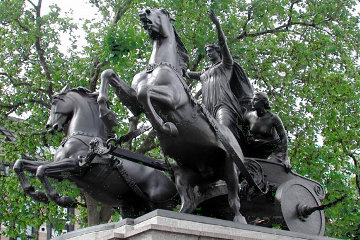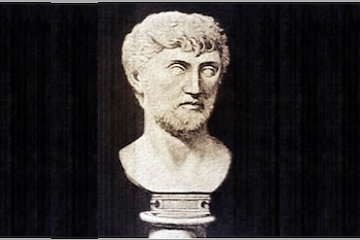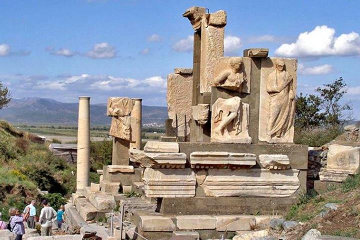Atoms and Scythes
It's the stuff of legend - Boadiccea in her war chariot drawn by prancing horses, her abused sisters crouching behind her, and sharp scythes sticking out from the axles on either side. I must admit, however, that I have always taken such pictures, even when immortalised in bronze on the Thames Embankment, with several large helpings of salt.

| |
| The statue of Boadicea on the Thames Embankment. Notice the scythe blades protruding from the wheels. |
In the first place, such weapons would be as much of a danger to your own side as they would to the enemy; the slightest deviation of course as the chariots charged and you would either cut the legs off your neighbour's horse or your scythes would stick into the spokes of his wheels, leading to a glorious smash!
In the second place, it is hard to see how they could be used against the enemy. If you ride along the line of the enemy, close enough to damage their legs, you will also be close enough for someone with a long spear to do you a bit of no good. If you charge head-on into the enemy your horses will be brought to a halt long before the scythes can do any damage. In any case we know that the ancient Britons galloped past the enemy in their chariots, hurling spears, but if they wanted to get up close and personal they stopped the chariot, dismounted and got busy with their battle axes and swords.
Finally, it is not at all clear whether the scythes would be effective weapons. Were they attached to the boss of the chariot wheel and rotated as the chariot moved? In that case most of the time the backs or sides of the scythes would be facing the direction of travel and while you might trip some of the enemy or give them a nasty whack on the legs, you would do no further damage. On the other hand, if they were fastened to the axles, could the chariot go fast enough to actually cut through flesh and bone, no matter how sharp the scythes?
So, as I say, I regarded it all as a bit of fantasy - picturesque, terrifying, but not actually dangerous.

| |
| The Roman author and Philosopher, Titus Lucretius Carus. |
And then the other day I began reading "On the Nature of the Universe" by the Roman author Lucretius. Lucretius, who lived from 99BC to 55 BC, was a committed follower of the Greek philosopher Epicurus, who is best known to us because he is alleged to have advocated that the greatest good was to enjoy oneself as much as possible (as opposed to the Stoics, who taught that the greatest good was to want as little as possible, in which case you could be happy no matter how poor you were!)
However Epicurus was also an atomist and taught that everything in the universe was made of atoms, not of earth, air, fire and water, which other philosphers taught were the four elements. Of course, when he spoke of atoms he had no idea of our modern conception of atoms made of protons, neutrons and electrons. His definition of an atom was "the smallest thing into which something can be divided".
There was an almost infinite variety of shapes and sizes of atoms to account for the different things we see in the world. Lemon juice, for example, was made of atoms with jagged edges and points which prickled the tongue, whereas cream was made of nice, rounded, smooth atoms that slid smoothly over the tongue. Water was made of small, round atoms that flowed along nicely and air was smaller and rounder still because it could flow even more easily. Rock, on the other hand, was made of solid, square-ish atoms that fitted together to make a solid, compact body - and the harder the rock, the squarer the atoms and the more closely they fitted together.
I rather suspect that it was this Epicurean notion of atoms which was behind St Paul's assertion that "Not all flesh is the same: People have one kind of flesh, animals have another, birds another and fish another. There are also heavenly bodies and there are earthly bodies; but the splendour of the heavenly bodies is one kind, and the splendour of the earthly bodies is another. The sun has one kind of splendour, the moon another and the stars another; and star differs from star in splendour." (1 Corinthians 15:39-41)

| |
| The Memmius Monument in Ephesus commemorating three generations of the family. |
Lucretius addressed his work to Gaius Memmius, a Roman sentaor and consul who during his term as governor of Asia set up a monument to himself and his family in Ephesus. Suspecting that Roman senators were not all that interested in philosophical arguments about the nature of things, Lucretius wrote his book in poetry - some 7,400 dactylic hexameters (if you are interested), with the result that it is full of vivid imagery and poetic language. The atmosphere is always "gusty air", for example.
Some of his conclusions are remarkably modern and you begin to think that the atomists were onto something, but then in the next paragraph he comes out with some nonsense that makes you realise that, lacking the concept of experimentation, the old Greek philosophers really didn't have a clue.
For example, he discusses magnetism. He has already established that things constantly give off thin sheets of themselves which our eyes are equipped to perceive and our noses to smell. He has also established that nothing is absolutely solid and it is the tiny pores which allow sound to penetrate stone walls. So lodestone gives off extra thick sheets of atoms and thus creates a vacuum near it and iron has atoms of air vibrating in its pores and these drive the iron towards the vacuum and thus towards the lodestone.
This is a remarkable mixture of truth and nonsense: today we know that a vacuum is possible, something which many scientists denied right up until the 19th century - "Nature Abhors a Vacuum!" We also know that atoms vibrate and these vibrations can exert a pressure. However we also know that lodestone does not create a vacuum, iron doesn't have tiny pores in which air vibrates, and nothing gives off thin sheets of itself for our eyes to pick up!
Alas, poor Lucretius, he didn't choose his wife's atoms carefully enough. According to accounts written after his death, his wife Lucilia became uncertain of her husband's affection and so she went to a "wise woman" and obtained a love potion. Either she overdid the dose or the stuff was poison in any case, but the result was that Lucretius went made and managed to write his book in his few intervals of sanity - which may be why the book appears to be unfinished, because the poor fellow killed himself at the age of 44!
But what, I can hear you ask, does all this have to do with scythes on chariots? Well, in Book III of his work Lucretius turns to the question of "Life and Mind". You will be pleased to know that "the atoms of spirit are not only much less in magnitude than those composing our body and flesh; they are also correspondingly inferior in number and scattered but sparsely through our limbs." He proves this by the fact that our minds do not feel dust settling on our bodies nor even insects crawling across them, so obviously the atoms of mind must be widely scattered!
He proves that mind and life, though widely scattered, are in every part of the body by appealing to some well-known facts about battle injuries.
They say that in the heat and indiscriminate carnage of battle, limbs are often lopped off by scythe-armed chariots so suddenly that the fallen member, hewn from the body, is seen to writhe on the ground. Yet the mind and consciousness of the man cannot yet feel the pain, so abrupt is the hurt and so intent the mind upon the business of battle. With what is left of his body he presses on with battle and bloodshed, unaware, it may be, that his left arm together woith its shield has been lost, whirled away among the chargers by the chariots wheels with their predatory blades. Another does not notice that his right arm has gone, while he scrambles and struggles. Another, who has lost a leg, does his best to stand up, while on the ground at his side the dying foot twitches its toes.
Lucretius, On the Nature of the Universe
Lucretius' argument, written to a man accustomed to war - Rome was in the middle of its civil wars at the time - would lose its force unless he was appealing to a well-known fact. In which case, we must admit that whatever the disadvantages or dangers of having scythe blades sticking out from your chariot wheels, such things were not just fantasies but actual facts whose utility in battle could be attested by many a one-legged Roman!
© Kendall K. Down 2016





